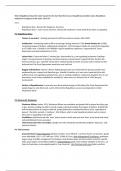Were Republican ideas the main reason for the fact that there was a Republican president and a Republican
majority in Congress in the years 1921-31?
Intro:
- Republican ideas, Democratic Weakness, Economy
- Republican ideas = main reason; however, Democratic weakness is what made these ideas so appealing
P1: Republican ideas:
- ‘Return to normalcy’ : Harding promised to shift focus back to America after WW1
- Isolationism: introducing trade tariffs to encourage ‘buying American’ (The Smoot-Hawley Act (1930)),
not joining League of Nations, cutting back immigrants- 1921 Emergency Quota Act restricted immigration
to 357,000 a year, 150,000 in 1924 (WASPs- typical republican supporters- supported this), Great
Depression increased isolationism in 1921,
- Laissez-faire: (‘leave well alone’), minimal gov. intervention (e.g. not regulating businesses- Harding’s
slogan: ‘less government in business and more business in government’ supported this), fed into the
American Dream, gov. used this ‘laissez-faire’ method during economic recession and it worked so they
believed that The Great Depression would also sort itself out
- Rugged Individualism: Hoover’s theory (letting people take care of themselves) because people were
weakened by gov. support and therefore gov. shouldn’t interfere as it was more important to be self-
sufficient (e.g. not regulating working hours, pay or working conditions- businesses should be free to run
themselves, even if they exploited the workforce), taxes were cut: Revenue Act of 1924 (less gov.
involvement)
- Decline of Republicanism: it was only once these policies began to fail during The Great Depression that
people began to vote Democrat, can be inferred that Republican success was dependent on their
‘Republican ideas’
P2: Democratic Weakness:
- Woodrow Wilson: before 1921, Woodrow Wilson was president and people felt he played too big a part
in gov. decision-making, he didn’t consult congress about promoting The League of Nations, drafted bills
and introduced them to Congress himself, people believed he violated the theory of the ‘separation of
powers’, therefore wanted a ‘small gov.’ after Wilson, which is why Republican policies such as laissez-
faire were so appealing to the public
- Prohibition: split Democrats into ‘wets’ (urban areas in north and east) and ‘dries’ (rural south and west),
anti-prohibitionist forces prevailed
- 1924 Democratic Party Convention: (fought over who should be presidential candidate- bad press, anti-
American dream)
P3- The Economy:
- Economic Boom: Mass Production (division of labor, more efficient- e.g. Henry Ford’s car factories- goods
more affordable, 1917: 4,727,468 cars, 1929: 23,060,421 cars, New Management Techniques, employers
began using ‘scientific management’ techniques, tasks broken down and each worker trained in specific
tasks, good wages and working conditions, Federal Policies: kept some wartime subsidies to farmers, cut
taxes on businesses, encouraged people to ‘buy American’, Hire Purchase and Loans before wartime,




